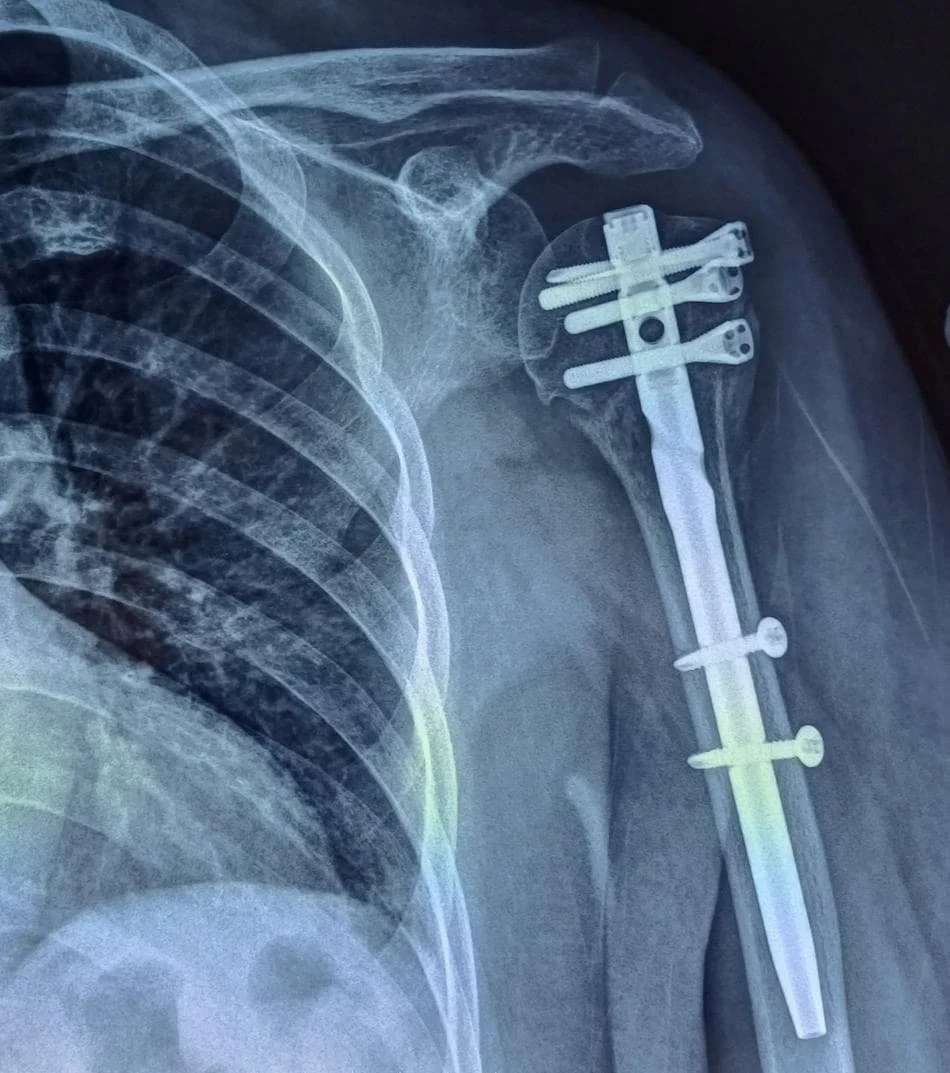
Restoring Function. Embracing Life.
Shoulder Fractures Specialist in Singapore
Dr Bryan Wang
Consultant Orthopaedic Surgeon
Trusted Orthopaedic Surgeon | Fellowship-trained in Canada | With over 20-years of experience
What are Shoulder Fractures?
A shoulder fracture refers to a break or crack in one or more of the bones that make up the shoulder joint. The shoulder is a complex joint composed of the humerus (upper arm bone), scapula (shoulder blade), and clavicle (collarbone). Fractures in any of these bones can result from various causes, including falls, accidents, direct impact, or high-energy trauma.
Types of Shoulder Fractures:
Proximal Humerus Fracture:
This involves a fracture of the upper arm bone (humerus). Fractures can occur in different parts of the humerus, such as the head, neck, shaft, or surgical neck. This is more common in older adults with osteoporosis; can involve the ball of the joint.
Scapula Fracture:
This type of fracture occurs in the shoulder blade (scapula) and can involve different parts of the scapula, such as the body, neck, or glenoid (socket) region. This is less common and usually caused high-energy trauma like car accidents.
Clavicle Fracture:
A clavicle fracture refers to a break in the collarbone. It's a common type of shoulder fracture and can occur due to falls onto the shoulder or outstretched arm.
Symptoms At a Glance
Pain, swelling, and tenderness around the shoulder area.
Limited or complete loss of movement in the shoulder joint.
Visible deformity or abnormal positioning of the shoulder.
Bruising and discoloration of the skin.
Numbness, tingling, or loss of sensation in the arm, hand, or fingers due to potential nerve involvement.
How to Diagnose?
Dr Bryan will conduct a physical examination to check for swelling, deformity, range of motion, and nerve function etc.
Order of X-rays to confirm the diagnosis, assess the type of fracture, identify fracture location and displacement as well as to determine if there are any associated injuries.
For more complex or joint-involving fractures, CT scan may be necessary to assess the injury.
Shoulder Fractures Treatment
What are my Treatment options?
If you have any of the symptoms above, it is advisable to see an orthopaedic specialist for further assessment. The appropriate treatment is decided after assessment and a collaborative discussion based on your needs. They can be broadly divided into conservative (non-surgical) and surgical options.
Conservative Treatment for Shoulder Fractures
Some fractures may be able to manage non surgical way such as immobilisation with an arm sling to allow healing, depending on the type and severity of the fracture.
Surgical Treatment for Shoulder Fractures
Surgical treatment for shoulder fractures is considered when the bones are displaced, unstable, involve the joint surface, or cannot heal properly with conservative care. The choice of surgery depends on which bone is fractured, the severity of displacement, the patient’s age, and functional needs.
Surgery involves realigning the bone fragments and using plates, screws, or other hardware to stabilise them.
Shoulder Fractures Surgical Options
1. Open Reduction and Internal Fixation (ORIF)
What it is: The surgeon repositions (reduces) the broken bone pieces and secures them with plates, screws, or pins.
Commonly used for: Displaced clavicle fractures, proximal humerus fractures, scapular fractures with joint involvement.
Goal: Restore anatomy, stability, and allow early motion.
2. Intramedullary Nailing
What it is: A metal rod is inserted into the bone marrow canal to align and stabilize long bone fractures (e.g., humerus).
Advantages: Less invasive, preserves soft tissues, early mobilization.
3. Hemiarthroplasty
What it is: Replacement of the humeral head (ball) with a prosthesis, keeping the patient’s own socket (glenoid).
Commonly used for: Severe fractures of the humeral head where repair is not possible.
Goal: Pain relief and partial restoration of function.
4. Reverse Total Shoulder Arthroplasty (RTSA)
What it is: A type of replacement where the ball and socket positions are switched.
Commonly used for: Severe fractures of the humeral head where repair is not possible in older patients
Goal: Allows the deltoid muscle to lift the arm instead of the damaged rotator cuff.

Why choose Beacon Orthopaedics?
Focused expertise: Dr Bryan Wang is fellowship-trained in Shoulder & Elbow and Sports Injuries (Pan Am Clinic, Canada) and previously served as Senior Consultant (CGH). He has taught at NUS, NTU, and Duke-NUS and is a member of AAOS, ISAKOS, and the Canadian Shoulder & Elbow Society.
Athlete-centred care: Dr Bryan Wang has many years of experience and expertise supporting professional athletes and weekend warriors alike; return-to-sport is built into your plan.
One stop centre: You can expect same-week imaging where appropriate, on-site/partner physiotherapy, and clear return-to-work/sport milestones all within one medical clinic.
Ready To Get Confident with Your Shoulder Again?
If you’re experiencing pain and swelling of your shoulder, having a visible deformity of the shoulder, or suspect a shoulder fracture, book an appointment with Beacon Orthopaedics, Singapore.
Early, accurate diagnosis and a structured plan can get you back to work, sport, and daily life with confidence.




